GREGORY HALEY
So You Want to Write a Novel?
8/21/2023
Writing a novel is a journey that starts with a single word. Any word will do. You can start with your favorite word. Everyone has a favorite word they love to hear because of how it makes them feel, or love to say because of how it makes their mouth move when they say it. My favorite word is 'ravenous.' That seems like a good place to start a story, for it is a story unto itself...
What story can you tell that is about the word ravenous? What images come to mind? What do the characters look like? How do they sound?
You see? You already have story to tell, now go out and tell it.
Mark Twain was once asked how he came up with so many great stories, and he replied, "I start with two or three characters I like, put them in an unusual situation, and then write what they would do." When asked what they would do, he replied, "I don't know, I haven't written it yet."
The best stories, and the best novels, are character driven. Even stories about historical events are built around individual characters and their reactions to those events. What is a character that interests you? How does that character react to danger? Take that journey with your character. You never know what they might do.
Another vital piece of advice, and one that almost everyone ignores and it blocks their writing, don't start at the beginning. That's a classic mistake that blocks even the most seasoned writers. Trying to write that great opening line that hooks your readers to the story can't be written until you know how the story is told, and you can't know that until you've written it.
The best place to start a novel is wherever a major event occurs that impacts the characters in your story. The first thing I wrote for Stranger in the Valley is a scene that doesn't occur in the book until page 260. It gave me an anchor point that I could write towards. It changed by the time I got to it, but not by a lot.
Go and write the scene that you dream about writing. Let it be your beacon on the page.
Many novels are built in pieces, like laying a foundation for a new house. You have to know where the plumbing is going to go, and have a plan for what it will look like when it's done, but it's constructed from the inside out. Novels are built the same way.
In fact, I've only ever heard of two authors who wrote novels by starting at the first word and writing straight through to the end. One is Isaac Asimov, but he was a brilliant freak of nature. The other is Jack Kerouac, who's novel "On the Road" was written on one long paper scroll in a stream of conscious exercise. But he did it because it is such an unusual way to write a novel.
So start with a word, a word you love. Create a scene full of unusual characters in an unexpected situation. Write what they would do, and then write all the small stories that lead up to it and the write the ones that follow. They don't have to be written in order.
The two most important things to remember about writing a novel to completion are:
1) Write the story you always wanted to read. Write the story you wish existed but doesn't. It will keep you interested and writing; and
2) Write every day.
Writer's write. That's what we do. It doesn't have to be good, it just has to be done. Give yourself a word count to aim for every day. Don't make it about time, or you'll find ways to "productively procrastinate" your way out of the writing. A word count is better.
It doesn't have to be long either. A hundred words is plenty to start with. They would only take a few minutes to write, and after a month you'll have 3,000 words and in 10 months you'll have 30,000.
Ray Bradbury famously wrote 1,500 words every day. That's a lot for even the most prolific writers, and he admitted most of them weren't good, but enough of them were. Stephen King, who is a freak of nature himself, writes 3,000 words a day. That's how he can turn out a 150,000 word novel every two months. For myself? I aim for 500 words a day. Most days I get there, and most days I write more. I also take weekends off to be with my spouse. It's a reasonable number of words, and I finish a manuscript about every six to nine months.
Finally, don't write a book that you "think will sell." It's a terrible strategy, and it won't. Write the story that excites you to tell. That will come through in your writing, and your readers will be excited too.
Now.... start with a word. Any word will do...